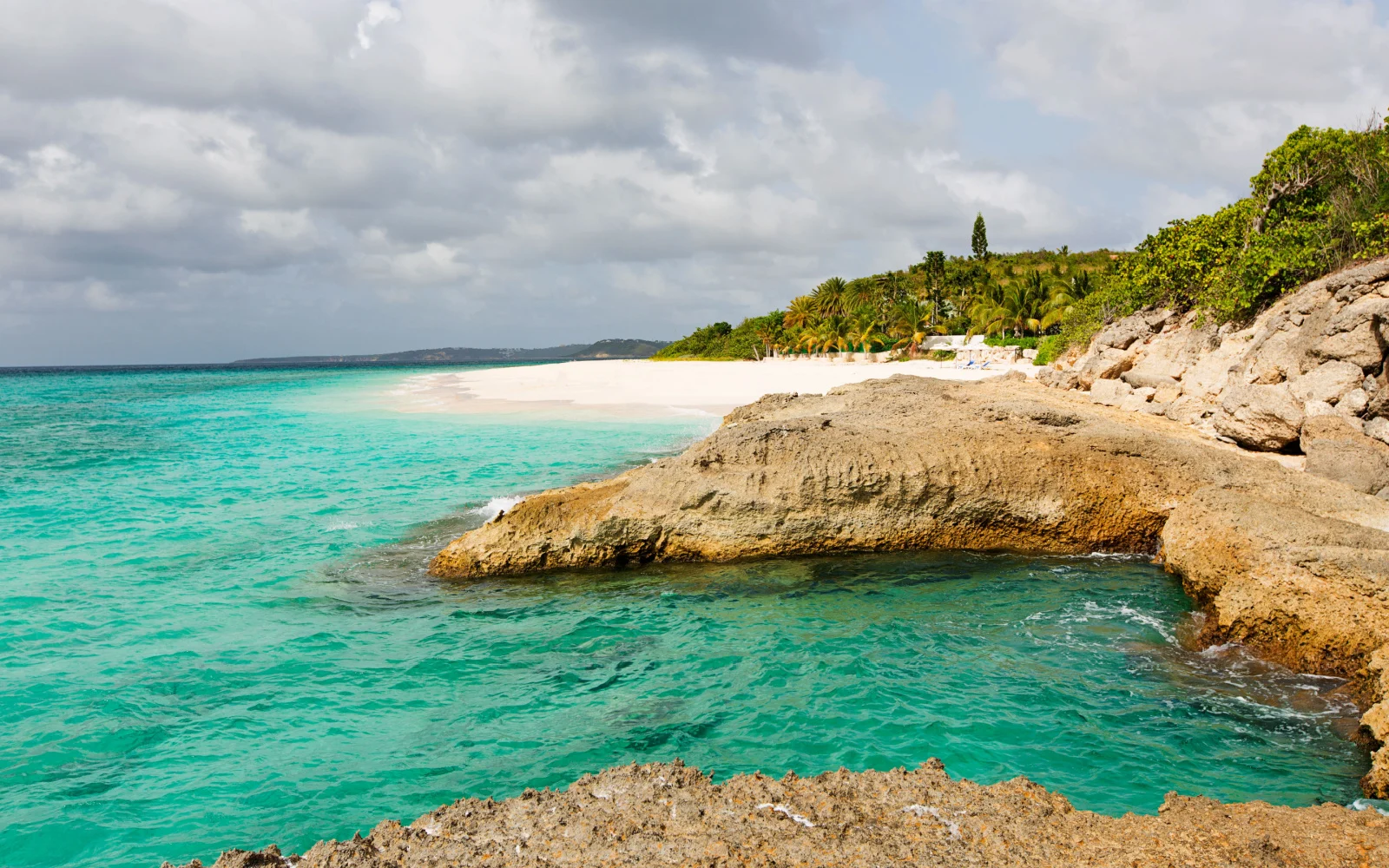Anguilla is a beautiful island in the Caribbean Sea that is part of Britain’s Overseas Territories, not an independent country. It is a popular tourist destination, especially for British citizens — during peak tourism times, it can receive over 30,000 visitors per month!
However, before going to any new destination, it’s important to research practical concerns such as safety. After all, many destinations in the Caribbean hide dangerous crime statistics beneath their pristine appearance.
But don’t worry — our travel experts made this detailed safety guide that can help you evaluate if a trip to Anguilla is safe or not. Let us be your guide!
Read Next: The 17 Safest Islands in the Caribbean in 2025
Is Anguilla Safe to Visit?
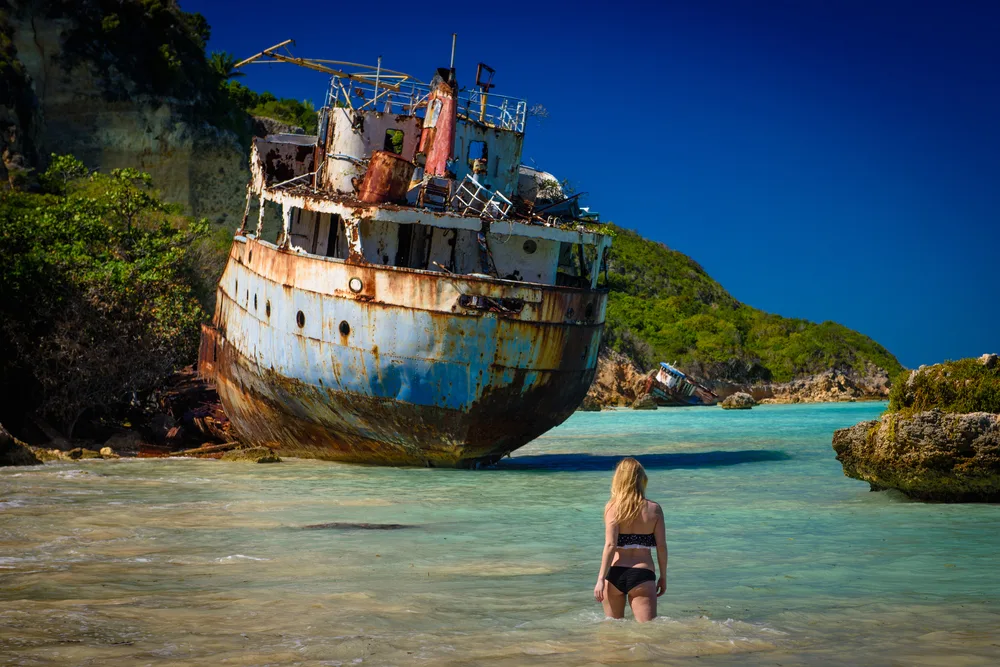
Kristopher Kettner/Shutterstock
Yes. Anguilla is one of the safest destinations in the Caribbean. It has a very low crime rate, although you should still take some precautions to protect your valuables.
Natural disasters such as hurricanes are a bigger threat to your safety than crime, so be sure to time your travels to avoid this problem.
A good place to start researching the safety of Anguilla or any other holiday destination is to look at travel advisories, whether from your own government or from other governments that are known for issuing detailed advice.
Most countries agree that Anguilla is a very safe place to visit.
The United States has Anguilla under a Level One travel advisory. Citizens are only advised to take normal precautions when they visit the island, the same precautions they probably take on vacation in other places and at home.
Other governments agree with the assessment that Anguilla is a safe country to visit. The New Zealand government doesn’t even bother issuing a specific travel advisory for Anguilla.
When governments mention potential problems in Anguilla in their travel advisories, they are mostly petty in nature.
You might encounter:
- Pickpocketing
- Beach theft
- Bag snatching
- Theft from vehicle
- Theft from hotel room
- Robberies
These crimes are mostly petty in nature. Violent crime against tourists is practically unheard of in Anguilla. You should take some basic precautions to protect yourself and your valuables.
Just because you’re on vacation doesn’t mean that you can abandon common sense. However, you don’t need to be so on guard that you don’t enjoy your vacation. In Anguilla, you need to be careful of natural disasters, namely hurricanes.
After all, it’s one of the Caribbean islands that gets hit by hurricanes regularly and is often battered by severe storms. For example, in 2017, Hurricane Irma damaged 90% of government buildings and vital infrastructure.
Hurricane season in Anguilla lasts from mid-May to November. Any storm has the potential to develop into a hurricane during this time, and there is nowhere to really hide from the power of the storms.
The best safety tip is to avoid traveling to Anguilla during hurricane season. If you do get caught in Anguilla during a tropical storm or hurricane, the Australian government has good advice for travelers caught up in severe weather abroad.
The best thing to do is to follow the advice of locals. Listen to all advisories from local government officials and follow advice from locals you meet such as guest house hosts and hotel managers.
Crime in Anguilla
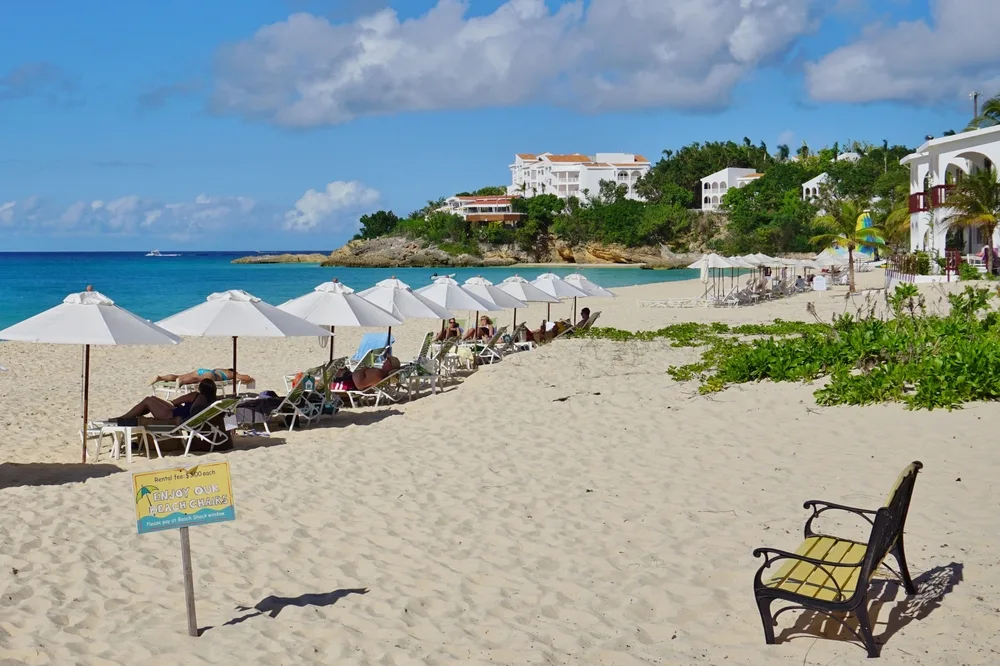
ANGUILLA –29 NOVEMBER 2014– Beautiful Meads Bay is one of the most beautiful beaches in the Caribbean island of Anguilla. Many hotels and restaurants line its white sand shore/EQRoy/Shutterstock
When visiting Caribbean destinations, most visitors are concerned about crime, and with good reason. Some Caribbean islands are very difficult places to live and visit despite their beauty.
For example, Jamaica has one of the highest murder rates in the world. Anguilla is very different from this perception of the Caribbean. Anguilla is an island with a very low crime rate.
It is one of the safest destinations in the Caribbean, which is why it is a popular vacation destination for families. According to Numbeo, the crime rate in Anguilla is very low. The British overseas territory scores a 12.50 out of 100 on the crime index, a very low value.
The crime people are most concerned about is drug abuse. Besides that, there are few crime incidents of note in Anguilla. There are a few reasons why the crime rate in Anguilla is so low.
It helps that the island is very small. The population is only 15,585 people. Most people live in small villages that are tight-knit, religious communities.
It’s pretty hard to get away with a crime in Anguilla because the likelihood of someone recognizing the criminal is very high — a powerful deterrent. There will always be people that try their luck with crimes of opportunity, but even these petty crimes are usually rare.
Violent crimes are practically unheard of on the island thanks to the small community feeling. Anguilla also experiences fewer social factors that contribute to crime in other Caribbean islands, such as poverty and a lack of opportunity.
Islanders enjoy a long life expectancy, stable currency, and stable societal conditions, pushing few people towards crime. However, not everything is perfect in Anguilla.
Many locals report concerns about increased drug use and substance abuse problems on the island. Local media have been complaining about the prevalence of drug abuse among young people for the past decade.
While most people who use drugs only use mild substances such as marijuana, harder drugs do exist. International criminals also use small islands such as Anguilla as part of their international drug trafficking routes.
The drug trade is behind most violent crimes that occur in Anguilla.
While the island has its problems like most places on Earth, it is overall a very safe place to visit. As long as you use some common sense, you should be fine during your trip to Anguilla.
Petty Theft
The most common crime you will encounter in Anguilla is petty theft. Crimes of opportunity like this happen in most places where tourism is the primary industry.
Petty theft incidents are not violent, but they are annoying to experience. The Canadian government warns travelers in its advisory for Anguilla that petty theft does occur.
It lists the types of petty theft you might encounter, such as pickpocketing, bag-snatching, and drug-related crime. Luckily, petty theft is easy enough to deter with the right precautions.
Keep your valuables in as safe a place as possible. Most hotels and high-end resorts have room safes. Put most of your cash, credit cards, and passport in the hotel safe and only carry what you need for the day, including a photocopy of your ID.
Leave expensive, heirloom jewelry at home while you are on vacation. Most people that come to Anguilla are beach tourists looking to relax. Most people, locals and foreigners alike, dress in a laid-back manner when they move around the island.
If you are wearing expensive designer clothing, heavy jewelry, or flashing a lot of cash, you will single yourself out as a potential target. The Irish government advises its citizens not to be flashy when traveling to Anguilla.
While you don’t have to invest in a money belt or other anti-theft bag, it is still a good idea to keep a close eye on your valuables and never leave them unattended. This is especially important when going to the beach.
Many travelers get robbed on the beach because they leave their things on the shore while they go swimming. When you go to the beach, even if you’re going on a private resort beach, take precautions to protect your valuables.
Try to leave most items in your hotel safe. If you have things with you that you don’t want to get stolen, designate one person to sit on shore with your things from the group or invest in a waterproof pocket for your phone and ID.
Robbery
While violent crime is fairly rare in Anguilla, muggings and armed robberies still occur sometimes. This problem is often fueled by drugs on the island.
In response, the UK government includes warnings about robberies in its travel advisory for Anguilla. However, most robberies can be avoided with a few precautions.
Most mugging incidents occur at night, so be careful with your movements after dark. Avoid walking in isolated areas such as beaches, small streets, or alleyways as you might be the victim of a crime.
If you decide to check out the nightlife, take a taxi back to your hotel instead of walking, especially if you are heading back alone. Don’t withdraw money from ATMs at night.
Avoid other things that might make you a target, such as wearing valuable jewelry, flashing lots of cash, or leaving doors and windows to your accommodation unlocked.
If you do get robbed, hand over your wallet because you don’t want to anger the robber. Focus on getting away to safety and reporting the crime. The police in Anguilla are fairly efficient.
Avoiding Bad Areas
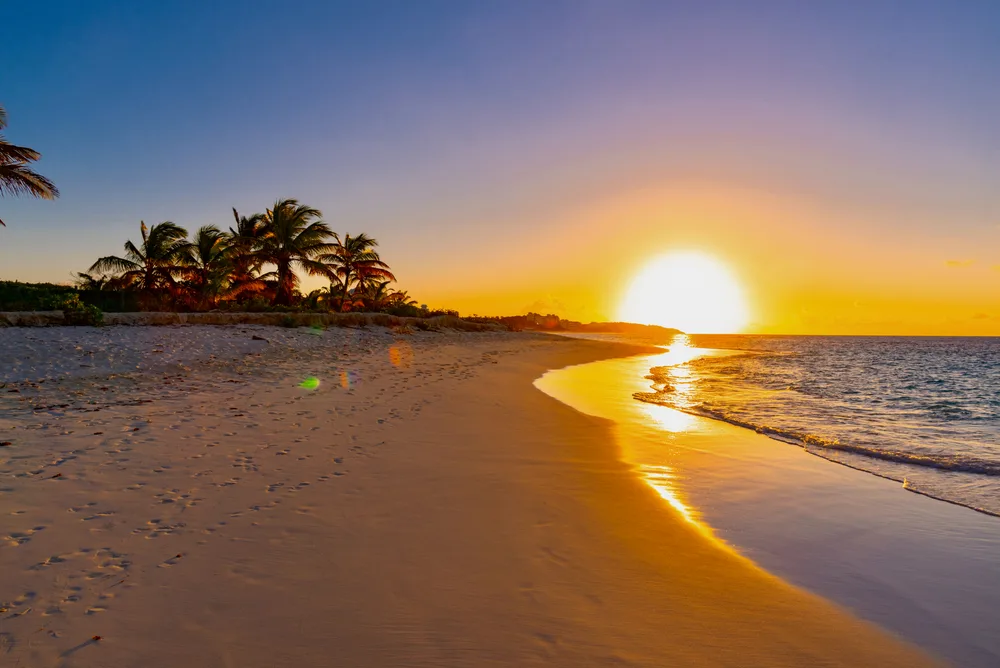
DiegoMariottini/Shutterstock
There are no places in Anguilla that are necessarily dangerous or that you should avoid. Avoid all isolated areas, including beaches, at night.
The Valley, Anguilla’s capital, has most of the population and that means most of the crime rate. Keep that in mind when you visit.
Things to Consider
Here are a few other safety tips for visiting Anguilla:
- Don’t use drugs. Drug penalties are very severe. You do not want to risk getting caught as the authorities don’t tend to look kindly on visitors that flaunt local laws.
- Anguilla is a conservative island. Don’t trust the stereotypes of the laid-back hedonistic Caribbean when you are here, as most people are conservative, religious Christians. Respect local norms by dressing more modestly when you are not on the beach. Bathing suits should only be worn on the beach and in resort areas. Outside, men should wear shirts and women shouldn’t wear skirts that are too short.
- Anguilla doesn’t have mosquito-borne diseases. However, it has mosquitos and the infamous no-see-ums, whose bites are very annoying! Protect yourself from bites with bug spray.
- There are free-roaming goats on most streets. That’s what you might expect from a rural island! If you rent a car, be careful when driving that a goat doesn’t jump in front of your car.
Frequently Asked Questions
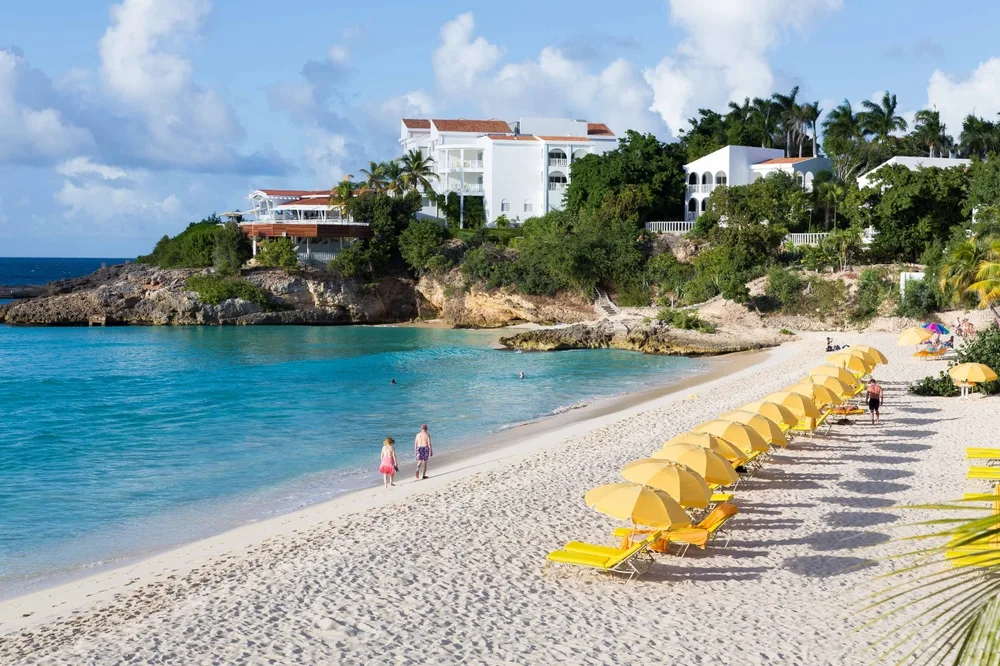
Maackel/Shutterstock
Here are some common questions people have about Anguilla:
What are the issues in Anguilla?
The primary issue affecting Anguilla is climate change. Climate change is intensifying the tropical storms and hurricanes that regularly hit Anguilla, which now devastate the island’s infrastructure and economy.
Is Anguilla expensive to visit?
For most people, Anguilla is expensive to visit. The island carved out a niche for itself as a luxury travel destination, so most accommodation consists of high-end resorts. It is possible to visit Anguilla on a budget if you get creative and research more affordable accommodation.
How many days do I need in Anguilla?
The answer depends on your vacation style, but most people spend 7-10 days in Anguilla. Keep in mind that there isn’t that much to do on the island besides swim and enjoy water sports.
Why do people go to Anguilla?
People go to Anguilla primarily because of the beautiful nature. Whether you want to lay on the beautiful sandy beaches, swim with wildlife, or explore the rocky inland, nature is the primary draw.
Can you swim in Anguilla?
Of course, you can swim in Anguilla! Swimming is the primary draw in Anguilla thanks to the beautiful sandy shores and warm water temperatures. However, if you visit during hurricane season, keep in mind that the water gets rougher then.
So, Should You Visit Anguilla?
Anguilla is the perfect safe Caribbean destination (as long as you don’t come during hurricane season). The crime rate is very low, so you just need to take basic precautions. So what are you waiting for — book your trip to this tropical paradise today!



